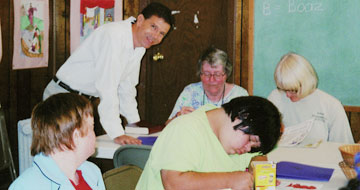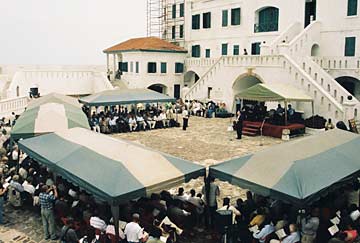Posted: 7/20/07
CYBER COLUMN:
Above, where Christ is
By John Duncan
I’m sitting here under the old oak tree, wondering where the summer has gone. Here in Texas, August beckons. Gerard Manley Hopkins, the poet, once quipped, “Mine, O thou lord of life, send my roots rain.” I have been away from the church for a sabbatical of sorts, rest, finding pleasure in reading and writing and resting and longing to return to my post as pastor to be with the people of God. The Lord is sending my dry roots rain. I feel refreshed.
I find myself thinking of the future, climbing Jacob’s ladder to peer in to what God has in store; gazing at Jeremiah’s future and a hope; scoping Paul’s letter to the Colossians (3:1) from prison where from the deep and dark he declares, “Keep seeking those things above, where Christ is… .” I think of the future, one with no land phones and digital, of green cars in an eco-friendly society and HD TV where at least we yearn to see the Dallas Cowboys or Dallas Mavericks in multi-color championships on crystal-clear screens. I think of the future, cancer walks and cancer research and cancer cures on the horizon. I think of the future, political speeches winding down and electronic election polls minus the chads; of hyped cars with powerhouse engines advertised with mega “horsepower”; of outsourcing in business and televised conference calls in HD TV with clear sound like talking to the neighbor next door; and of churches with digitized sound and big screens and bands like the Beatles echoing praise choruses and rhythmically blasting hymns high to the heavens. The future is wide screen and wide open. Yes, keep seeking the things above, where Christ is.
Still my mind drifts to the gospel. For all the technological wizardry, the gospel still impacts people one person at a time by river sides, in the marketplace, over coffee or a meal, at grave sites, and in homes where people pray for the light to shine in dark places. Henri Nouwen once declared of “Christian leadership in the future,” “It is not a leadership of power and control, but a leadership of powerlessness and humility in which the suffering servant of God, Jesus, is made manifest.” Nouwen invites leaders to humble themselves as Christ to be servant leaders.
All told, humility is a difficult thing. C.S. Lewis once noted that his “school life was a life almost totally dominated by the social struggle, to get on, to arrive, or, having reached the top, to remain there, was the absorbing preoccupation.” Come to think of it, the climb to the top in business or an organization to which you belong or, dare I say it, in the church, as often happens, and the drive to get ahead, control and dominate, seems to me, to be one of life’s ongoing struggles. We never really outgrow school life—the jockeying for position, the jokes, the jealousy, the envy, the bullying that goes on and the cliques. Still, getting to the top and a preoccupation with “the top,” is different from, “Keep seeking the things above, where Christ is.”
Getting to the top might find you preoccupied, but prideful. After all, Lewis adds, “Pride leads to very other vice … and is an anti-God state of mind.” Now I doubt that any of us ever think of ourselves as anti-God in any state of mind. On the other hand, though, I guess most of us have demonstrated pride, to a co-worker, toward a spouse, or even a church member. This, of course, is why we seek the things above, where Christ is, so that it rids us of pride and leads us to serve Christ in our present and future. Still, yet, to seek the things above we must first fall down before Christ in humility.
It is complex in principle, but maybe a picture helps. I am thinking under this old oak tree on this hot Texas summer day of two people. Last spring on the same Saturday I was privileged to preach both their funerals. They were different, but alike, saints on the journey of struggle, but humble in their hearts to the core and to the end.
First there was Phyllis. Phyllis worked at the local Texaco gas station. That is where I first met her, paying the fare, discussing rising gas prices, and taking her prayer requests as she offered them because she knew I was a pastor. She lived from 1939 to 2007 and lived in California, Arkansas, Tennessee and Granbury, Texas. She lived a quiet, humble life with her cats and a dog named Stormy. She liked to listen to Elvis, who, by the way, does not live in Granbury and has never appeared here as far as I know, but Granbury once had an Elvis impersonator named Care Dyer who sang at a hangout on the local town square, “the man of a thousand voices,” who could sing to the rafters like Elvis and look like him and shake his leg just the way Elvis did. Phyllis liked listening to Elvis, and at her funeral Elvis sang “Amazing Grace, “ music off of one his old albums, of course.
Phyllis had humble beginnings, born to sharecroppers in a shack in Earle, Ark., loved to watch western movies, and spent most of her days scanning gas credit cards, discussing the price of gas, stocking gas station shelves with sugary sodas, and talking to Stormy when she got home from work.
Phyllis assured me she knew Christ, a “recovering Methodist,” as I think she once named herself. She never came to our church because she worked on Sundays, but always requested prayer and accepted her simple plight in life without complaint or desired fanfare. She lived humbly in the shadows of life and in the sunshine. And the Light of her life was Christ. She quietly kept seeking the things above, where Christ is.
Then there was Raymond Croy. Phyllis died after 67 years of age. Raymond died after 93 years. Raymond was born in 1913 in Arcadia, La. President Franklin D. Roosevelt proclaimed a “new deal” for the American people back in the 1930’s and formed the WPA (Worker’s Progress Administration) and his grandfather, brother-in-law, and father-in-law all worked for the WPA for $1.50 an hour. Raymond’s first job was in the Ringgold Saw Mill for 15 cents an hour. He later moved to Shreveport, then to Fort Worth, where he enrolled in the seminary. Raymond worked a full-time job and attended seminary for three years until his health deteriorated. His family physician instructed him to quit seminary, but Raymond never stopped serving Christ nor seeking the things above. He served in small churches, served as a deacon at Travis Avenue Baptist Church in Fort Worth as well as a deacon here in Granbury at Lakeside Baptist for 14 years.
Bother Raymond lived in the same house on James Avenue for 43 years and drove the same car for 28 years, a 1948 Chevrolet. Who lives in the same house and drives a car that long any more? Raymond worked for Bell Helicopter until 1978, and then retired. He never retired from serving, preaching, teaching and praying. I loved to hear Raymond pray. He prayed with words a southern drawl, his voice deep and resonating as a man who knew God personally. He prayed one-syllable words with two syllables, words like “our” and “God” with a humming intonation, “Our-a God-a.” He prayed sweet prayers, deep ones, from the depths of his soul, calling out light to Light, begging for Light to penetrate the darkness and for the peace God’s wondrous grace to sweeten the soul of a world in chaos. Raymond for all his long life sought the things above, where Christ is.
P.T Forsythe once spoke of shutting the chamber door, praying quietly, audibly, humbly to the Lord. “Write prayers and burn them,” he wrote in 1913. Brother Raymond’s prayers intimately rattled heaven’s throne and touched the heart of God, and his prayers burned in his heart as though the only two people present were him and God. He kept seeking the things above, where Christ is.
Oh, humility is challenging. Those who possess it, however, know God and understand themselves and serve quietly, humbly, find a way to be salt and light in the world that is dull and dark, and simply going about living life seeking Christ daily.
So here I am under this old oak tree, feeling refreshed, longing for the future and enjoying Christ’s grace in the present. James, the half-brother of our Lord, once wrote (James 4:10), “He who humbles himself will be lifted up.” He sounded exactly like Jesus, who once said in Luke 4:11, “He who humbles himself shall be exalted and he who exalts himself will be humbled.” I am praying, “Mine, Oh Lord, send my roots more rain. Lord, send my roots more of your reign.” And I am watching, praying, ever aiming to walk humbly in the glow of his grace and anticipating the future that stands wide screen and wide open to the possibility of God’s glorious and humble future work. I keep seeking the things above, where Christ is.
John Duncan is pastor of Lakeside Baptist Church in Granbury, Texas, and the writer of numerous articles in various journals and magazines. You can respond to his column by e-mailing him at jduncan@lakesidebc.org.
News of religion, faith, missions, Bible study and Christian ministry among Texas Baptist churches, in the BGCT, the Southern Baptist Convention ( SBC ) and around the world.


